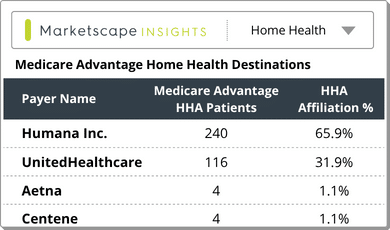Carter Bakkum, Senior Data Analyst, Healthcare Insights
Carter is a senior data analyst who works to turn complex, messy data into actionable intelligence. Carter studied economics and statistics at the University of Virginia before joining an economic consulting firm, where he supported expert testifying economic witnesses on behalf of fortune 500 healthcare companies. After the significant changes in the importance of data analytics during the pandemic, Carter joined the Trella team to dive deeper into the numbers to uncover the stories that drive our experience.Hospice Agencies’ Role in the Education of Physicians and Facilities
By Carter Bakkum | January 27, 2022
Highlights:
- Total cost of care for beneficiaries receiving hospice more than three months before death was an average of $23,000 lower than beneficiaries that received no hospice care in the last month of life.
- Compared to patients who did not utilize hospice, the average total cost of care for patients who utilized hospice early decreased by $20,000 in the last six months of life.
- Representatives of hospice agencies have synergistic incentives to discuss how hospice can benefit patients and physicians in quality of life and the total cost of care.
- Additionally, the responsibility lies with these representatives to educate physicians and administrators of the immense increases in financial savings and beneficiary quality of life of hospice care.
A Physician’s Approach to End-of-Life Care
In Being Mortal, a non-fiction book by Atul Gawande, the surgeon emphasizes physicians’ roles in discussing how to enable geriatric patients to live a fulfilling, meaningful life amid the reality of an aging body. Dr. Gawande proposes new approaches for physicians to have conversations about the end of a patient’s life. Dr. Gawande’s strategies underscore the importance of open, honest discussions between physicians and patients about the truth of a patient’s final days.
While some physicians are no doubt already practicing this method for tackling the end of a patient’s life, it is difficult for doctors to keep up with the latest end-of-life research. Physicians and administrators rely heavily on synthesized, robust research performed by third parties to understand when certain types of care or therapies are essential. Hospice agency representatives serve a critical role of not only educating physicians of the quality of their individual hospice agency but also informing them of what hospice patients are appropriate for hospice care.
Benefits of Dr. Gawande’s Approach in the U.S.
Applying Dr. Gawande’s idealistic view to the reality of a for-profit medical system yields some surprising synergies. U.S. healthcare continues to march towards a value-based care system, making one of the best strategies hospice representatives can utilize – aside from the increase to the quality of life for patients close to the end – the immense financial incentives for Accountable Care Organizations (ACOs) to encourage early adoption of hospice care. Of the over 900,000 Traditional Medicare Fee-For-Service (FFS) beneficiaries who died between January 2018 and December 2019 with at least one acute stay, almost half (47%) received no hospice care. The total cost of care in the month prior to death for patients with no hospice care is $28,119, six times higher than those who received early hospice care (more than three months before death), with an average total cost of $4,913. Between two weeks and three months before death, even moderate hospice timing decreases the total cost of care in the last month to $9,781, a third of the cost for beneficiaries that received no hospice care.
A crucial aspect of patients’ quality of life is preventing acute stays, which means more time spent with family. In the last month of life, patients who were not admitted to hospice care were ten times more likely to have an inpatient stay than early adopters of hospice care. Physicians and hospice representatives must keep the quality of life in mind when determining whether hospice care is appropriate. Patients are considered to have received the full benefit of hospice if their length of stay is 90+ days. Shockingly, only 7% of patients who died between 2018 and 2019 received their full hospice benefit.
This data is pulled from Trella Health’s 100% access to Part A and Part B FFS Medicare claims. Keep an eye out for the Industry Trend Report in March 2022 to learn how these metrics changed during the COVID-19 pandemic.
Trella Health is the leader in market intelligence for the 65+ population, with extensive data sets including Medicare FFS, Medicare Advantage, commercial payers, ACOs, and DCEs. For more insights into how to stand out as a preferred referral partner, schedule a demo today.













